Thousands of team
officials and athletes are arriving this week, and throngs of visitors
are expected to follow. But should they be worried?
The security concerns
were triggered last week when it emerged that private security
contractor G4S, which was supposed to have provided 10,400 guards for
the Olympics and Paralympics, would not be able to deliver.
Its failure to recruit,
train and vet enough staff in time led the government to announce last
week that it was deploying an extra 3,500 troops to cover the shortfall.
G4S said it has only
about 4,000 guards trained and ready, although it hopes to have 7,000
fully accredited by the time the Games begin on July 27.
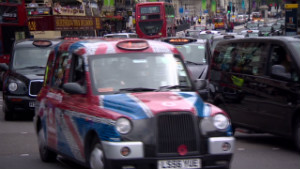 Cabbies protest 'Olympic lanes' in London
Cabbies protest 'Olympic lanes' in London
 An Olympic athlete's diet
An Olympic athlete's diet
 Olympic coach turns tragedy into triumph
Olympic coach turns tragedy into triumph
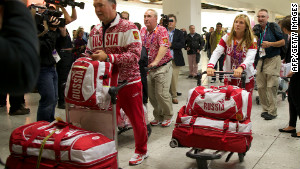 Olympic athletes arriving in London
Olympic athletes arriving in London
While the recruitment
failure by G4S is highly embarrassing for the company -- and led its
share price to drop sharply -- the Games' organizers insist that their
contingency planning will keep everyone safe.
Visitors can certainly expect to see far more visible security measures in place than usual at Games venues and transport hubs.
Sebastian Coe, the
chairman of the London organizing group, LOCOG, said Tuesday that the
only real difference resulting from the G4S debacle would be in who is
performing the security checks.
"The numbers really
haven't changed. It's really simply about the mix of security on the
park," he was quoted as saying by the Press Association news agency.
LOCOG is working with
G4S to try to ensure that as many people as possible are accredited in
time, Coe said, adding, "This is not a failure in numbers. We've got the
numbers there. There's no compromise on security."
Home Secretary Theresa
May gave a similar message last week as she was grilled by lawmakers on
the matter, saying, "There is no question of Olympic security being
compromised."
Critics have been less
positive, with some Labour Party lawmakers concerned that security will
be inadequate or that visitors will be made uncomfortable by a prominent
military presence.
The chief executive of
G4S, Nick Buckles, was forced to agree Tuesday under questioning from
lawmakers that the security staffing fiasco is "a humiliating shambles
for the country."
The Home Office said
Monday that G4S is suffering from a software problem, which means the
contractor cannot guarantee who will turn up where and whether guards
have the right training.
The guards employed by
G4S will be responsible chiefly for such tasks as providing venue
perimeter security, a spokesman for the contractor said. This includes
manning X-ray machines, searching people, searching vehicles and
operating closed-circuit television systems, he said.
People with tickets for
Olympic events have been sent e-mails giving details of the security
requirements for each venue. These include airport-style limits on the
size of bags that can be carried and the quantity of liquids that can be
taken in.
One such e-mail reads,
"Be prepared for security checks when you arrive: this will be like
taking an international flight at an airport. It will be busy and you
will have to queue, so get there early."
The 17,000 British
military personnel deployed for the Games, including the extra 3,500
troops called up at short notice, are to help out with the security
checks and stewarding at venues, as well as specialist tasks such as
bomb disposal and sniffer dog searches.
Military jets and
helicopters are also on standby around the capital, ready to respond to
any threat, and new airspace restrictions came into force Saturday
around London and the southeast.
The Royal Navy's largest
ship, the helicopter carrier HMS Ocean, is now moored in the Thames off
Greenwich, where it will act as a base for helicopter operations and
house 400 troops providing security at the Greenwich Park Olympic venue.
Police in London and elsewhere also will play a big role in ensuring security.
Well before the G4S
debacle hit the headlines, London's Metropolitan Police Service, known
as the Met, was planning what it says is its biggest-ever peacetime
operation.
The operation will "run
for 66 days and cover over 1,000 venues, including those hosting Olympic
and Paralympic sports, cultural events and 2012-themed celebrations
taking place across the capital," the website says.
On the busiest days, up
to 9,500 police officers will be used, including some from forces
outside London, for Games-related operations, it says. Officers at
Olympic venues will focus on preventing crime and keeping people and
their property safe, while G4S is responsible for the security
operation, it says.
Away from the venues, the Met will also have to provide the usual policing for the city and its visitors.
The Games come just over
a year after parts of London were rocked by rioting that led to police
being brought in from elsewhere in England to help bring the disorder
under control.
The threat of a
potential terrorist strike has also been in the news in recent days
after a number of arrests, although police said the operations were not
linked to the Olympic Games.
The terror threat level
on the UK Home Office website remains unchanged at "substantial," which
is the third highest of five levels. The next level up is "severe,"
which means an attack is "highly likely," and the highest is "critical,"
meaning an attack is "expected imminently."
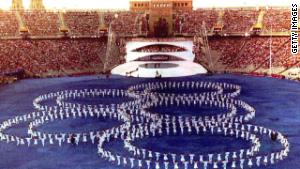 Olympic games transformed Barcelona
Olympic games transformed Barcelona
 Montreal's Olympic legacy
Montreal's Olympic legacy
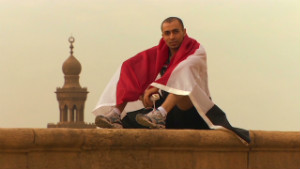 Olympic training sidelined by revolution
Olympic training sidelined by revolution
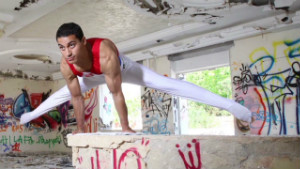 From Tunisia uprising to London Olympics
From Tunisia uprising to London Olympics
Government officials
from Washington to London insist that there are no known specific or
credible terror threats tied to the Olympics.
Travel to and around the United Kingdom will nevertheless be a focus of security efforts.
Visitors arriving at
London's Heathrow Airport can expect to see every desk at passport
control manned during the Olympic Games, the home secretary said last
week.
Immigration desks have
extra staffers, Heathrow said Monday, amid fears of long lines to get
into the country as security checks are carried out. Retired border
officials and retired police officers are among those being brought in
to supplement immigration staff, the Home Office said.
Officials from outside the United Kingdom may also be lending a hand in certain areas.
The UK Department for
Transport said a small number of staff from the U.S. Transportation
Security Administration will be based at certain British airports "to
act as an on-site liaison for the TSA." The TSA staffers will not,
however, be conducting security screening or inspections, the Department
for Transport said.
U.S. State Department
spokesman Patrick Ventrell said Tuesday that his country has full faith
and confidence in Britain's ability to provide security.
The United States is
sending senior diplomatic security staff to Britain to act as liaisons,
Ventrell said, adding that the TSA has a "handful" of agents in the
country.
Meanwhile, London's
public transport authorities have been warning commuters for weeks to
avoid travel hotspots around the time of the Games -- but have not
stressed any additional security risk.
The city's transport
network is not immune to terror threats, as the attacks of July 2005
showed. But visitors can seek reassurance in the fact that Britain's
police and intelligence officials have been successful since then in
foiling attacks on the capital. In the 2005 incident, three bombs were
detonated on underground trains and one on a bus in the city. The blasts
killed 52 people and wounded more than 770.
Culture Secretary Jeremy Hunt, who is in charge of the Olympic preparations, said it will be "a very safe and secure Olympics."
"We have had a contractor who has let us down ... but we had a contingency plan in place," he said.
"It's not possible to
secure every single square inch of a huge global city like London, but
where there are important concentrations of Olympic activity ... then
there will be a security regime before you can enter those. Obviously
the actual Olympic venues will be very tightly secured."
Hunt said the vigilance of the public will also be important.
"So far, we have not
received intelligence of any particular additional threats, but this is a
city that has huge experience of dealing with security issues over very
many years," he said.
No comments:
Post a Comment